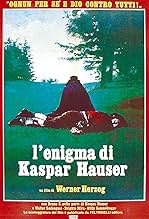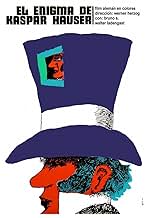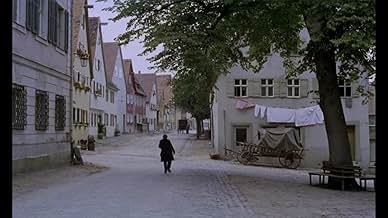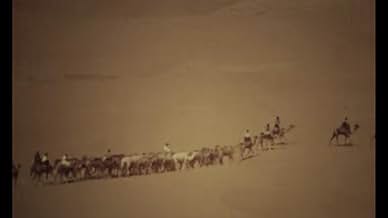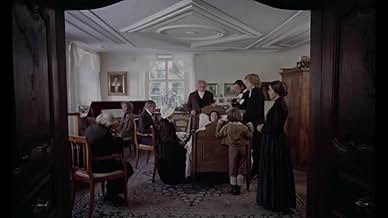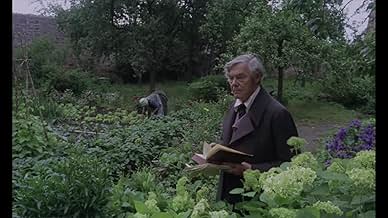IMDb RATING
7.7/10
20K
YOUR RATING
A young man named Kaspar Hauser suddenly appears in Nuremberg in 1828, barely able to talk or walk, and bearing a strange note.A young man named Kaspar Hauser suddenly appears in Nuremberg in 1828, barely able to talk or walk, and bearing a strange note.A young man named Kaspar Hauser suddenly appears in Nuremberg in 1828, barely able to talk or walk, and bearing a strange note.
- Awards
- 5 wins & 3 nominations total
- Director
- Writers
- All cast & crew
- Production, box office & more at IMDbPro
Featured reviews
"This is the story of a soul", someone said and I agree because loneliness is here described through a slow moving plot and endless silences which make us see Kaspar Hauser not as a man but as something more sulfuric, almost a being from outer space. The performance of Bruno S. is simply moving and caused me a lot of tears and the use of time through the narration is perfect for a film of this kind. The poetic vision of Werner Herzog is very peculiar and unique and you can love it or hate it but you cannot ignore it. Herzog doesn't care about the audience, he tells what it wants in the way he likes and that's the praise and the defect of European cinema and it's what makes the difference between European authors and American ones.
Werner Herzog's films reach emotional and aesthetic levels that few directors can aspire to. As one of the rare film-maker's more concerned with the artistry of their work than what they achieve at the box office, Herzog is nearly peerless in his purity and ideosynchrasy. Herzog uses the film medium as a moving canvas upon which he expresses, affects, and creates nightmares and dreamworlds which are so vividly real that they threaten our own naturalized consciousness of the projection we call reality.
So much for the postmodern gobbledygook. As you can tell, I love Herzog.
This early film deals with many of the familiar elements that tend to permeate Herzog's films - cultural critique, the insanity of everyday life, alienation, cruelty and power. But here, Herzog uses a true story of 19th century Europe as a vehicle, and treats his subject with an unusual compassion and straightforwardness.
Herzog's incredible casting talent also shows here, just as it does in all of his films. I do not wish to take anything away from the great performers, but really, how does one manage to choose an actor whose life experience is broadly similar to that of Kaspar Hauser's without knowing of it beforehand? This film blends somewhat disjointed artistic imagery with the true story of Kaspar Hauser, a man apart from society who has been kept in a cellar all of his life, and is suddenly expelled into the light in Nuremburg. He is adopted by a kindly old gent who attempts to socialize him in what appears to Kaspar (and perhaps to us through the film's clear vision) an insane society full of lies and contradictions. All of this is done with the believability that is so consistent in Herzog's theatricality, and the visual quality that qualifies him as a true cinematographic artist.
So much for the postmodern gobbledygook. As you can tell, I love Herzog.
This early film deals with many of the familiar elements that tend to permeate Herzog's films - cultural critique, the insanity of everyday life, alienation, cruelty and power. But here, Herzog uses a true story of 19th century Europe as a vehicle, and treats his subject with an unusual compassion and straightforwardness.
Herzog's incredible casting talent also shows here, just as it does in all of his films. I do not wish to take anything away from the great performers, but really, how does one manage to choose an actor whose life experience is broadly similar to that of Kaspar Hauser's without knowing of it beforehand? This film blends somewhat disjointed artistic imagery with the true story of Kaspar Hauser, a man apart from society who has been kept in a cellar all of his life, and is suddenly expelled into the light in Nuremburg. He is adopted by a kindly old gent who attempts to socialize him in what appears to Kaspar (and perhaps to us through the film's clear vision) an insane society full of lies and contradictions. All of this is done with the believability that is so consistent in Herzog's theatricality, and the visual quality that qualifies him as a true cinematographic artist.
This is the third Werner Herzog film I have watched. The first two were Signs of Life and Aguirre: The Wrath of God. All for themselves and God against All is by far my favorite Herzog movie (and my favorite title). The exploration of Kaspar's primitive mind was fascinating and, at times, even humorous. I enjoyed Kaspar's disdain for the arrogant priests and scientists (but especially the priests!). Like every Werner Herzog movie I've seen thus far, the film does not progress at breakneck speed. This is definitely a turn-off to most movie-goers. I can relate. (Signs of Life had me checking my signs of life). However, I felt that the significant and often humorous dialogue more than made up for the admittedly slow pace.
Even if this film had failed on the level of character or narrative (which it doesn't), I would still love this movie for its incredible imagery. The memory/dream sequences are haunting and will never leave my head. The opening shot of a field, long blades grass bowing under the wind to the music of Pachelbel, is extraordinary. And of course there's the performance of Bruno S, the most intensely hypnotic and genuine performance you will ever see.
But my favorite scene is of the impresario and the dwarf king and his kingdom. This is a true Herzog moment -- bizarre but somehow still a moment of striking epiphany -- the dwarf a parallel, isolated soul to Kasper's own isolated, lonely soul. The extremity and weirdness of moments like these seem commonplace and everyday in a Herzog film, and therefore somehow commonplace and everyday even in our own lives.
But my favorite scene is of the impresario and the dwarf king and his kingdom. This is a true Herzog moment -- bizarre but somehow still a moment of striking epiphany -- the dwarf a parallel, isolated soul to Kasper's own isolated, lonely soul. The extremity and weirdness of moments like these seem commonplace and everyday in a Herzog film, and therefore somehow commonplace and everyday even in our own lives.
Werner Herzog's strange and enticing film divulges only what is known of the account of Kaspar Hauser, played by Bruno S., who dwelled for the first 17 years of his life shackled in a small basement room with nothing more than a toy horse to occupy him, without all contact with humans or other living things save for a stranger who gives food to him. One day in 1828, the same anonymous figure takes Kaspar out of his chamber, schools him on a handful of expressions and how to walk, and then leaves him standing still in a cobblestone court in Nuremberg. Kaspar is the focus of novelty and interest and is even put on display in a circus before being saved by an aristocrat who slowly and good-naturedly endeavors to renovate him. Kaspar gradually learns to read and write and forms unorthodox perspectives on religion and logic, but music is what gives him great pleasure. He draws the attention of members of the clergy, professors, and aristocracy.
The most telling scene is in fact my favorite, when Kaspar is being schooled by a psychologist who asks him a classic brain-buster, to which Kaspar gives an effortless, unusual, perfectly legitimate answer that is swiftly rejected by the psychologist for not being the standard answer. The people surrounding Kaspar in Herzog's film are perfectly subjugated, as in the scene where a little girl tries to teach Kaspar a nursery rhyme, and while it's clear that he doesn't know the meaning at all of the rhyme like she does and that he hasn't even developed as far as a small child, it's also clear that the small child has not developed far enough to know how to educate someone with less common knowledge than her.
Herzog chronicles the real-life mystery of Kaspar Hauser not so much as a creepy mystery but as a character study that demonstrates that society's traditional manner of perceiving the world may not essentially be the most well-founded or defensible, hence the film's brilliant original title, Every Man For Himself and God Against All, as all but laid bare when Kaspar's assertion that apples are tired is apparently substantiated by the incapability of his aristocratic savior to show support of the argument that they are lifeless objects subject to human control.
Bruno S. is Herzog's beautiful achievement. Bruno S., the disdained son of a prostitute, was beaten so cruelly by his mother as a toddler that he fell deaf for awhile. This caused him to be institutionalized for the next 23 years in countless institutes, regularly committing petty crimes. Regardless of this horrendous history, he became an autodidactic painter and musician. At the same time as these were his beloved pursuits, he was also pressed to take jobs in factories. Herzog saw him in a 1970 documentary, he swore to work with him. In and of himself, Bruno S. attested to the power of Herzog's vision. He was exceptionally strenuous to work with, at times not so much wanting but requiring numerous hours of screaming a scene could be shot. Owing to all of this, Bruno S. literally is a Kaspar Hauser, an inordinately tortured soul utilized for the sake of revealing the shock value of reality's hidden ugliness to common society. Kaspar is taken under the wing of several groups of people but whether their intentions are good or bad, he can never seem to live a life without the exploitation of his completely removed mind for the commotion of nobility or business.
Short of an accepted narrative or dramatic construction and full of indistinct imagery generated only by Herzog's instinct, many unexplained elements never resolve themselves in Herzog's unique character study, and they shouldn't. His encapsulating only what the world knows of this very little-known story intensifies the intrigue of it. Why did this strange person do this to Kaspar Hauser? Who was he?
The most telling scene is in fact my favorite, when Kaspar is being schooled by a psychologist who asks him a classic brain-buster, to which Kaspar gives an effortless, unusual, perfectly legitimate answer that is swiftly rejected by the psychologist for not being the standard answer. The people surrounding Kaspar in Herzog's film are perfectly subjugated, as in the scene where a little girl tries to teach Kaspar a nursery rhyme, and while it's clear that he doesn't know the meaning at all of the rhyme like she does and that he hasn't even developed as far as a small child, it's also clear that the small child has not developed far enough to know how to educate someone with less common knowledge than her.
Herzog chronicles the real-life mystery of Kaspar Hauser not so much as a creepy mystery but as a character study that demonstrates that society's traditional manner of perceiving the world may not essentially be the most well-founded or defensible, hence the film's brilliant original title, Every Man For Himself and God Against All, as all but laid bare when Kaspar's assertion that apples are tired is apparently substantiated by the incapability of his aristocratic savior to show support of the argument that they are lifeless objects subject to human control.
Bruno S. is Herzog's beautiful achievement. Bruno S., the disdained son of a prostitute, was beaten so cruelly by his mother as a toddler that he fell deaf for awhile. This caused him to be institutionalized for the next 23 years in countless institutes, regularly committing petty crimes. Regardless of this horrendous history, he became an autodidactic painter and musician. At the same time as these were his beloved pursuits, he was also pressed to take jobs in factories. Herzog saw him in a 1970 documentary, he swore to work with him. In and of himself, Bruno S. attested to the power of Herzog's vision. He was exceptionally strenuous to work with, at times not so much wanting but requiring numerous hours of screaming a scene could be shot. Owing to all of this, Bruno S. literally is a Kaspar Hauser, an inordinately tortured soul utilized for the sake of revealing the shock value of reality's hidden ugliness to common society. Kaspar is taken under the wing of several groups of people but whether their intentions are good or bad, he can never seem to live a life without the exploitation of his completely removed mind for the commotion of nobility or business.
Short of an accepted narrative or dramatic construction and full of indistinct imagery generated only by Herzog's instinct, many unexplained elements never resolve themselves in Herzog's unique character study, and they shouldn't. His encapsulating only what the world knows of this very little-known story intensifies the intrigue of it. Why did this strange person do this to Kaspar Hauser? Who was he?
Did you know
- TriviaTo perform the scene in which Kaspar learns to walk, actor Bruno S. knelt for three hours with a stick behind his knees until his legs were too numb to stand.
- GoofsIn a brief scene we see a stork eating a frog with its legs tagged (ringed), but bird ringing didn't start until the end of the nineteenth century, decades after the life of Kaspar Hauser.
- Quotes
Opening caption: Do you not then hear this horrible scream all around you that people usually call silence.
- Crazy creditsOpening credits prologue: One Sunday in 1828 a ragged boy was found abandoned in the town of N. He could hardly walk and spoke but one sentence.
Later, he told of being locked in a dark cellar from birth. He had never seen another human being, a tree, a house before.
To this day no one knows where he came from - or who set him free.
Don't you hear that horrible screaming all around you? That screaming men call silence?
- ConnectionsFeatured in Je suis ce que sont mes films (1978)
- SoundtracksCanon in D major
Composed by Johann Pachelbel
- How long is The Enigma of Kaspar Hauser?Powered by Alexa
Details
- Release date
- Country of origin
- Language
- Also known as
- The Enigma of Kaspar Hauser
- Filming locations
- Croagh Patrick, Westport, Mayo, Ireland(archive footage)
- Production companies
- See more company credits at IMDbPro
Box office
- Gross worldwide
- $3,451
- Runtime1 hour 50 minutes
- Sound mix
- Aspect ratio
- 1.66 : 1
Contribute to this page
Suggest an edit or add missing content

Top Gap
By what name was L'énigme de Kaspar Hauser (1974) officially released in India in English?
Answer

